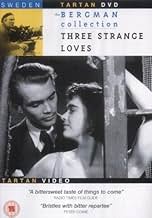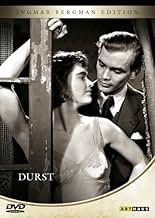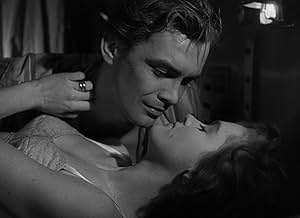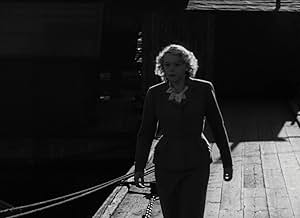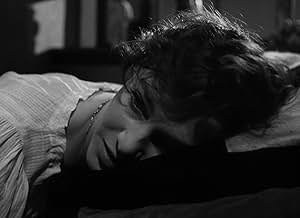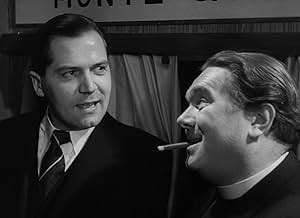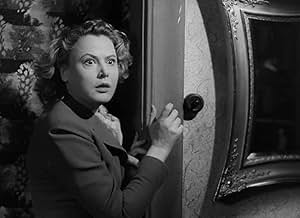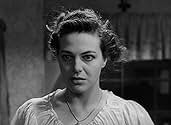AVALIAÇÃO DA IMDb
6,5/10
3,1 mil
SUA AVALIAÇÃO
Adicionar um enredo no seu idiomaA needy couple in a bad marriage travel back to Stockholm after a trip to Italy. Meanwhile, a widow resists seductions from two different persons - her psychiatrist and a lesbian friend.A needy couple in a bad marriage travel back to Stockholm after a trip to Italy. Meanwhile, a widow resists seductions from two different persons - her psychiatrist and a lesbian friend.A needy couple in a bad marriage travel back to Stockholm after a trip to Italy. Meanwhile, a widow resists seductions from two different persons - her psychiatrist and a lesbian friend.
- Direção
- Roteiristas
- Artistas
Mimi Nelson
- Valborg - Ruts kamrat i balettskolan
- (as Mimmi Nelson)
Carl Andersson
- En man i kupén med festande tågpassagerare (1)
- (não creditado)
Wiktor Andersson
- Doorkeeper
- (não creditado)
Verner Arpe
- Tysk biljettsamlare
- (não creditado)
Ingmar Bergman
- Tågpassagerare
- (não creditado)
Britta Brunius
- Sjuksköterskan efter Ruts abort
- (não creditado)
Calle Flygare
- Den danske prästen på tåget
- (não creditado)
Inga Gill
- Lady at Hotel
- (não creditado)
Herman Greid
- Stadsbudet i Basel
- (não creditado)
Helge Hagerman
- Den svenske prästen på tåget
- (não creditado)
- Direção
- Roteiristas
- Elenco e equipe completos
- Produção, bilheteria e muito mais no IMDbPro
Avaliações em destaque
Bergman's first foray into marriage - a long visited topic for him. Moving on from a previously familiar summer holiday romance scenario that ends in pregnancy termination, the story shows how the now sterile ex ballet dancer faces frustrations with her new husband. The married soldier that was the subject of her affair (I presume he was killed in action), leaves a widow who comes to haunt her, in spirit and in body.
For Bergman, we see his first slightly bleached-out ultra close up and face to face shot. The psychiatrist too makes a first appearance as emotional damage is pursued as a topic. There's also quite a bit of flash-backing and a train journey that runs through most of it which is supposed to symbolise both a passage in time but also the empty, barren vessel she now feels herself to be.
The distinctively intelligent dialogue that so appeals to me is sharp and acerbic, probably for the first time. "I only stay alive so I can keep you as miserable as you've always kept me" is typical of Ingmar's angst. Subtleties of depressive subjects such as suicide are shown by someone leaping to their death into water but all we hear is a plover or some-such seabird changing its call.
A little lumpy in its narrative but for those who love Bergman, the gems are starting to shine and we are reassured by the burgeoning qualities of who we now know to be one of the World's greatest ever directors.
For Bergman, we see his first slightly bleached-out ultra close up and face to face shot. The psychiatrist too makes a first appearance as emotional damage is pursued as a topic. There's also quite a bit of flash-backing and a train journey that runs through most of it which is supposed to symbolise both a passage in time but also the empty, barren vessel she now feels herself to be.
The distinctively intelligent dialogue that so appeals to me is sharp and acerbic, probably for the first time. "I only stay alive so I can keep you as miserable as you've always kept me" is typical of Ingmar's angst. Subtleties of depressive subjects such as suicide are shown by someone leaping to their death into water but all we hear is a plover or some-such seabird changing its call.
A little lumpy in its narrative but for those who love Bergman, the gems are starting to shine and we are reassured by the burgeoning qualities of who we now know to be one of the World's greatest ever directors.
The early Bergman films are interesting in how they portray an artist evolving with increased experience. They're not always successful artistic endeavors overall, but they show how a studio system can foster and hone talent through experience.
Thirst tells the story of a young married couple on their way back from a vacation in Italy. We see them in France as they are about to board a train through 1946 Germany back towards Sweden. The woman is haunted by a previous affair and a subsequent abortion all while she nurses a bad knee in the hopes that one day she will dance ballet again. The husband is a penny pinching academic obsessed with coins and who had had an affair with another woman out of, what he calls, pity for her status as a widow. None of this is a secret, all of the sins are out in the open.
The two have the kind of talks typical in Bergman films (in particular his later, post-existential films like Scenes from a Marriage) and come to the conclusion that they should reconcile their differences and try to work through their problems to a happy marriage in the film's final moments.
The problem with the movie is its structure. This could be a case study in a poorly structured story pretty much killing a film. The first twenty minutes are dedicated to flashbacks to the wife's affair with a lieutenant in the Swedish military before we ever meet the husband. The husband's lover is first mentioned about thirty minutes into the movie, and she is introduced a few minutes later in a scene with her cruel psychologist. She then disappears for a half hour. There's also the wife's old dancing friend who appears in another flashback and then shows up with the husband's former lover, trying to seduce her which ends up leading to the lover's suicide.
The problem isn't the events themselves, but the fact that they are bunched together without any real effort to weave it in and out of the other threads. As typical, I read the essay in the Criterion Collection's large book and was unsurprised to discover that the script (which Bergman didn't write) was based on a series of short stories. Considering my issues with the film's structure, it made perfect sense. It felt very staccato with one story going through its beginning, middle, and end before another one took over. It's not quite that, but, especially considering the initial twenty minutes with the wife's lover, it feels very apropos.
I do think that if the movie had been re-arranged it would have worked better. I don't think it's something that purely an editing job would have done. At least some of it would have needed to originate at the script. The husband's lover needed at least one more scene to flesh her out for instance (her first scene with the psychologist is highly emotionally delivered and feels out of place because we had never met her before).
Stylistically, the movie feels very Bergman. The topics he loved are there (the marriage, even the dancer is a performer that he frequently featured). His visual style sometimes feel a little more active than normal, but we clearly see his visual tics such as two people in frame talking to each other, letting actors demonstrate who they are through long exposures to their smaller actions, and strong performances throughout. I just wish the story had been arranged in a way that made sense.
Thirst tells the story of a young married couple on their way back from a vacation in Italy. We see them in France as they are about to board a train through 1946 Germany back towards Sweden. The woman is haunted by a previous affair and a subsequent abortion all while she nurses a bad knee in the hopes that one day she will dance ballet again. The husband is a penny pinching academic obsessed with coins and who had had an affair with another woman out of, what he calls, pity for her status as a widow. None of this is a secret, all of the sins are out in the open.
The two have the kind of talks typical in Bergman films (in particular his later, post-existential films like Scenes from a Marriage) and come to the conclusion that they should reconcile their differences and try to work through their problems to a happy marriage in the film's final moments.
The problem with the movie is its structure. This could be a case study in a poorly structured story pretty much killing a film. The first twenty minutes are dedicated to flashbacks to the wife's affair with a lieutenant in the Swedish military before we ever meet the husband. The husband's lover is first mentioned about thirty minutes into the movie, and she is introduced a few minutes later in a scene with her cruel psychologist. She then disappears for a half hour. There's also the wife's old dancing friend who appears in another flashback and then shows up with the husband's former lover, trying to seduce her which ends up leading to the lover's suicide.
The problem isn't the events themselves, but the fact that they are bunched together without any real effort to weave it in and out of the other threads. As typical, I read the essay in the Criterion Collection's large book and was unsurprised to discover that the script (which Bergman didn't write) was based on a series of short stories. Considering my issues with the film's structure, it made perfect sense. It felt very staccato with one story going through its beginning, middle, and end before another one took over. It's not quite that, but, especially considering the initial twenty minutes with the wife's lover, it feels very apropos.
I do think that if the movie had been re-arranged it would have worked better. I don't think it's something that purely an editing job would have done. At least some of it would have needed to originate at the script. The husband's lover needed at least one more scene to flesh her out for instance (her first scene with the psychologist is highly emotionally delivered and feels out of place because we had never met her before).
Stylistically, the movie feels very Bergman. The topics he loved are there (the marriage, even the dancer is a performer that he frequently featured). His visual style sometimes feel a little more active than normal, but we clearly see his visual tics such as two people in frame talking to each other, letting actors demonstrate who they are through long exposures to their smaller actions, and strong performances throughout. I just wish the story had been arranged in a way that made sense.
Interesting film, but this is clearly not the very best of the great Bergman. Several relationships are examined under the microscope (so far, so Bergman). The film jumps around between the relationships in a slightly distracting way, but eventually you get to the bottom of who used to be with whom etc.
Gosh it's bleak out there, Bergman seems to share Strindberg's views on marriage and relationships at this time - the references to Strindberg stress that point. There's adultery, bitter rows between partners, lesbianism (inexplicit) and suicide. It ought to have me at the edge of my seat, but somehow doesn't quite do the business for me in the way that most Bergman films do. Perhaps this one hasn't aged well.
Worth seeing for the dedicated Bergman fan - it's pretty short and has its moments. If you are looking for an initial view of Bergman, look elsewhere.
Gosh it's bleak out there, Bergman seems to share Strindberg's views on marriage and relationships at this time - the references to Strindberg stress that point. There's adultery, bitter rows between partners, lesbianism (inexplicit) and suicide. It ought to have me at the edge of my seat, but somehow doesn't quite do the business for me in the way that most Bergman films do. Perhaps this one hasn't aged well.
Worth seeing for the dedicated Bergman fan - it's pretty short and has its moments. If you are looking for an initial view of Bergman, look elsewhere.
Bergman is beginning to develop some of his personal traits to be found in the later, more mature film. He hasn't yet learned to unveil the characters quite yet but the interactions are quite interesting. There are several stories going on here and a couple of groups of characters and sometimes the switching back and forth can be confusing. I would certainly agree with one reviewer that "thirst" was used not only metaphorically throughout but quite literally from the first image of an eddy of water during the credits to the very end. The characters are always drinking something or other - water (it's midsummer after all), wine(one of the characters is an alcoholic), even milk. The characters are actually quite self-centered, as in so many of Bergman's earliest films, and not particularly likable. The scene with the "therapist" was especially disturbing and the characters seem more prone to bounce off each other than anything. It's when they start to communicate that the trouble really begins to brew as we've learned from the later films.
Curtis Stotlar
Curtis Stotlar
Raul's a dislikeable chap, gets the feeling that he's being trapped, in the blink of an eye, it's adios, goodbye, marches off vowing not to come back.
Ruth is quite high maintenance, takes everything that you can dispense, she'd turn you to a husk, grinding you down to dust, at her mercy without strong defence.
Bertil's nightmare hasn't come true, the bottle he threw he withdrew, a small recompense, brings him back to sense, but next time he might not wake to two.
Valborg plays life solitaire, her secret her shame not to share, though with Eva she tries, it all ends in surprise, back to solitude with no one to care.
Eva is lost all alone, a vulnerable hand she's been sown, now she's starting to fade, as she tries to evade, cascades to the depths as if blown.
Several intertwined strands reflect the frailties, the ignorance and the disappointments we've all encountered at some time or another - although hopefully with a little less melodrama.
Ruth is quite high maintenance, takes everything that you can dispense, she'd turn you to a husk, grinding you down to dust, at her mercy without strong defence.
Bertil's nightmare hasn't come true, the bottle he threw he withdrew, a small recompense, brings him back to sense, but next time he might not wake to two.
Valborg plays life solitaire, her secret her shame not to share, though with Eva she tries, it all ends in surprise, back to solitude with no one to care.
Eva is lost all alone, a vulnerable hand she's been sown, now she's starting to fade, as she tries to evade, cascades to the depths as if blown.
Several intertwined strands reflect the frailties, the ignorance and the disappointments we've all encountered at some time or another - although hopefully with a little less melodrama.
Você sabia?
- CuriosidadesThe first of three theatrical films directed by Ingmar Bergman that he did not write.
- Versões alternativasThe Tartan region 2 DVD restores the ending of the scene between Viola and her lesbian former schoolmate Valborg, in which the latter tries to seduce the former by getting her drunk. This had been cut by the Swedish censors before the film's original release and had never been seen publicly before 2004.
- ConexõesReferenced in Dårskapens hus (1951)
- Trilhas sonorasNon più andrai
(uncredited)
from "Le nozze di Figaro"
Music by Wolfgang Amadeus Mozart
Swedish Lyrics by Bernhard Crusell
Sung by Bengt Eklund
Principais escolhas
Faça login para avaliar e ver a lista de recomendações personalizadas
- How long is Thirst?Fornecido pela Alexa
Detalhes
- Tempo de duração
- 1 h 23 min(83 min)
- Cor
- Proporção
- 1.33 : 1
Contribua para esta página
Sugerir uma alteração ou adicionar conteúdo ausente

